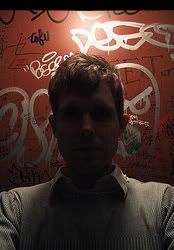INTERVIEW - Steve Erickson Submits to a Horror Rorschach Test
 In 2000, a friend loaned me the book Days Between Stations, a sort of apocalyptic love story. The book made me uneasy, the writing style was unfamiliar to me and resisted my brain's attempts to absorb it. "But you have to admit," my friend said, "The guy can fucking write."
In 2000, a friend loaned me the book Days Between Stations, a sort of apocalyptic love story. The book made me uneasy, the writing style was unfamiliar to me and resisted my brain's attempts to absorb it. "But you have to admit," my friend said, "The guy can fucking write."
During one strange summer in Los Angeles, I found myself returning to Steve Erickson's books on my own, and before long I was steeped to the eyeballs in visions of parallel histories and futuristic near-misses. Arc D'X is about as dark as tales come, but red coals of humanity burn all the hotter in the void. I loan my copies with discretion; they have a habit of never being returned.
Erickson's latest book Zeroville is still on my to-read list, but I figured it couldn't hurt to skip ahead and see if he'd share his thoughts on horror. His take on apocalypse as featured in film -- as well as a knockout top ten list -- can be found in my AMC feature. I'm glad to be able to share a few more of his comments right here.
On his characters' uncanny ability to adapt to "apocalyptic" circumstances:
"I wanted the apocalyptic to serve as a backdrop for the drama taking place among the characters. It’s one of the reasons I’ve always tended to think of myself as a fairly traditional writer even as I get tagged 'post-modern' or 'experimental,' two terms I hate. The conflicts are traditional conflicts but the backdrop is phantasmagoric -- in Our Ecstatic Days a young mother searches for her lost son in an L.A. where, almost overnight, a lake has appeared that grows and grows, swallowing up the city. The story takes on a surreality exactly for the reason you say, because in the context of the narrative the fantastic is accepted as banal or ordinary, or barely even noticed. In any case it’s almost never the point."
On his fascination with dense metropolises and remote outposts:
"I think this gets at that feeling of liberation that apocalypse engenders -- and if you’re a writer it’s enormously liberating to be able to create your own map, landscape, geography, however you want to put it. I currently live in what some people would consider a remote outpost of a dense metropolis (Topanga Canyon) -- L.A. has a way of combining the two. I’m not sure there’s another city where major canyons exist smack in the middle -- so the idea of a lake appearing in the middle, for instance, doesn’t seem so crazy. In Zeroville L.A. almost becomes a city of neurons, with the main character, a kind of “cineautistic” proto-punk who’s obsessed with movies, sometimes drifting among movie theaters as though they’re outposts or way stations.
On the inadequacy of the term "horror":
"I think 'horror' is about the most subjective of genres... I tried to be a bit of a purist about it and adhere to what seemed to me the integrity of your question. So I’m not sure there’s anything on my list that might not be on someone else’s. What is true is that I don’t strictly define horror as what scares me, though some of these movies do scare me, and one or two -- Moju, for instance -- are barely watchable, they’re so horrific. But the movies I chose are those that get to me in some deeply unsettling way, and that stay with me.
"I’ve noticed a number of your other listers/interviewees have cited, as have I, The Bride of Frankenstein rather than the original Frankenstein, not because it’s scarier – if anything it may be less scary – but because, I assume for them as for me, it’s more haunting. Bride fuses the fear of the monstrous with the more common fears of love and rejection that thereby give the inhuman monsters their humanity. A movie like Fascination is often silly if not outright bad, sort of cheesy Eurotrash -- but besides the prurient appeal of Brigitte Lahaie, which I wouldn’t deny for a second, naked in a cape with a scythe she might have stolen from Death in The Seventh Seal, there’s a hallucinatory, Baudelairean quality that sticks in the mind years after you’ve seen the picture. By contrast The Exorcist is a terrifying movie in terms of the way it skillfully builds its tension and freaks you out, but while I believe in evil, and even something I’m perfectly willing to call “god,” the Judeo-Christian notion of the Devil is not something that has resonance for me, and therefore the movie doesn’t either."
Whew. Really glad it occurred to me to ask! This makes a lot of my former Q&A's seem like hit-and-runs, and I have to say his list of films is a totally different flavor than I've seen so far -- though I have the strangest feeling that there's a missing number between 9 and 10...










No comments:
Post a Comment